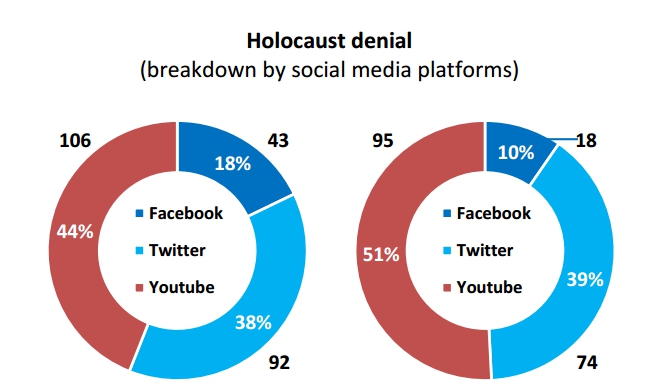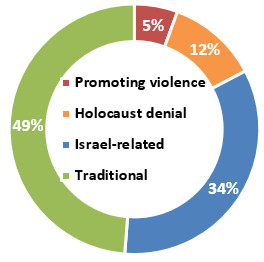FOR IMMEDIATE RELEASE: On International Holocaust Remembrance Day, a pioneering research by the Online Hate Prevention Institute “Measuring the Hate: the State of Antisemitism on Social Media” finds that of the three largest social media platforms, YouTube is the largest repository of content promoting Holocaust denial, followed by Twitter and then Facebook. The research, which tracked the items over a period of 10 months, also found that while Facebook has started responding rapidly to removing such content, both Twitter and YouTube lag behind.
The reports adds impetus to the demand by Jewish bodies worldwide for Holocaust denial to be banned by social media platforms as hate speech. The report strengthens the argument that social media is playing a critical role in promoting Holocaust denial and Holocaust revisionism theories. It is taking them from the margins of discredited academic research and sham journalism to mainstream society. In turn, such lies are fuelling growing antisemitism and violent extremism, particularly, in the Arab world and certain Muslim communities.
The report tracked 241 items of Holocaust denial from the three different social media platforms, and found that only 54 items were removed over 10 months, from March 2015 to January 2016. Of these, most were removed from Facebook.
Removal of Holocaust denial content between March 2015 and January 2016
The report also shares examples of such content from the different platforms.
Holocaust denial is one of the four categories of antisemitism tracked in the research. The other categories of antisemitism are promotion of violence against Jews, Traditional Antisemitism (conspiracy theories and racial slurs) and New Antisemitism (Israel-related antisemitism). The report examined 2,024 items of antisemitism from Facebook, YouTube and Twitter.
Breakdown of data as per different categories of antisemitism.
As per the report, Holocaust denial on social media takes place in two forms. First is outright denial of the fact that the Holocaust ever occurred or claiming that the number of Jews killed is grossly exaggerated. The second form mocks the victims of the Holocaust. The report examines how such deliberately offensive content is aimed to demonize and dehumanize the Jewish community and shares numerous examples of the same.
Holocaust denial is also linked to Modern Antisemitism, a concept explained at the special plenary session of the United Nations General Assembly on January 22, 2015, by the French philosopher and writer Bernard Henri Lévy. He explained that the argument goes, “The Jews are all the more detestable because they are believed to base their beloved Israel on imaginary suffering, or suffering that at the very least has been outrageously exaggerated. This is the shabby and infamous denial of the Holocaust”. Thus, it encourages hatred against Jews by suggesting that they demand special privileges based on a lie. Such hate then foments violent extremism and radicalisation across parts of the Arab world.
Social media companies can no longer shirk their responsibility from the pernicious misuse of their platforms to foment hate and spread lies and misinformation. Governments around the world are demanding better regulation of hate, incitement and radicalisation material. Last year, German prosecutors launched a criminal investigation against senior Facebook executives in response to growing incitement on the platform against immigrants, and Facebook, Google and Twitter have since agreed to remove hate speech reported in Germany within 24 hours and to use the definition of German law rather than their own standards. Facebook has since announced a one million dollar project to tackle online hate in Europe.
Holocaust Denial on social media is a critical form of hate speech that OHPI combats. You can see all the work we have done to uncover and counter Holocaust Denial on social media at: https://ohpi.org.au/holocaust-denial/
The full report is available at: https://ohpi.org.au/measuring-antisemitism/
NOTES
The Online Hate Prevention Institute (OHPI) is an Australian charity dedicated to tackling the problem of online hate including antisemitism, online extremism, cyber-racism, cyber-bullying, online religious vilification, online misogyny, and other forms of online hate attacking individuals and groups in society. OHPI aims to be a world leader in combating online hate and a critical partner who works with key stakeholders to improve the prevention and mitigation of online hate and the harm it causes. Ultimately, OHPI seeks to facilitate a change in online culture so that hate in all its forms becomes as socially unacceptable online as it is in “real life”.
Please help share this press release:
The Online Hate Prevention Institute’s reports are released for free to increase their impact. The work is made possible by public donations, you can donate to help support this vital work. You can also support OHPI on our Facebook page and stay updated by joining our mailing list.


